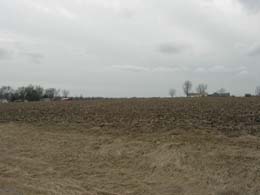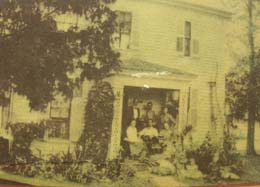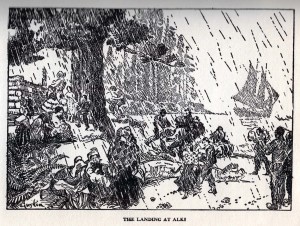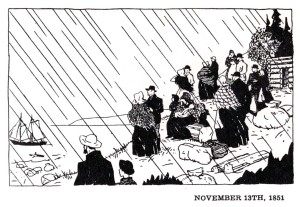
Site of Cherry Grove, Illinois (now called Cedar), 2006
I’ve never been to Cherry Grove, Illinois, but it owns real estate in my imagination. Cherry Grove is part of Seattle’s founding story: it was the place the Denny Party, our pioneers of record, came from.

Louisa Boren’s friend Parmelia Dunlap’s home, Cherry Grove, Illinois. Courtesy Marie Olinger.
There is a line, then, connecting the place the Denny and Boren clan knew as a tiny town in Knox County, Illinois and which now barely exists on maps, a dotted path between that particular point on the prairie and our great city. It was a trail — The Trail — to the Oregon country. Arthur Denny made journal entries as they traveled. Anyone today can hold his little diary in their gloved hands at University of Washington Libraries Special Collections. The trail ended in Oregon City. From there the Dennys eventually made their way north to what they dubbed New York-Alki and we now call West Seattle, to start their history here, our history here, our fabled past. They foraged, logged, took land grants, platted, built the city.
I know two people who’ve been to Cherry Grove: one of my sons and my husband. They traveled there a decade ago, prompted by a school project, and my son wrote about his trip. The woman who owns what was the Dennys’ land knew only one other Seattleite who’d ventured there, the novelist Brenda Wilbee, whose fictional treatment of David and Louisa Boren Denny and their families spans six volumes.

New York-Alki: a long way from Cherry Grove. (Paul Gustin, from Roberta Frye Watts, Four Wagons West)
We are connected with our past, all of our former places, by visible and invisible ley lines. By energy, wagon ruts, iron rails, highways. By research, by imagination. And when even one of us goes back, it makes our shared past tangible.

Illustrations of the Denny Party’s Alki landing always emphasize the rain. (Florenze Clark, from Sophie Frye Bass, Pigtail Days In Old Seattle)
P.S. Last but not least, I’d like to invite readers in the Seattle vicinity to attend Betty MacDonald: Behind The Scenes, a special presentation I’m giving for the Book Club of Washington this Sunday, March 8, 2015, at 3:00 at Dearborn House. The event celebrates BCW’s first chapbook, a recently discovered short story Betty Bard (MacDonald) published in Seattle’s arts weekly the Town Crier in January 1933.
March 6, 2015

